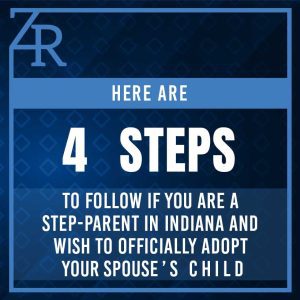When a parent gets divorced or is a single parent with a child born out of wedlock, it’s relatively common for a new spouse to want to adopt that child as their own. There could also be other reasons for step parent adoption.
No matter the reason, the adoption process is always complex, and important steps must be taken to get the adoption approved. At Zentz & Roberts, P.C., our Indiana family law adoption lawyers have years of experience helping with adoption proceedings. We offer several legal adoption services and can help you navigate your case to ensure the best possible outcome.
Can a Step Parent Adopt a Child?
Yes, a step-parent can officially adopt a child in Indiana. Typically, the purpose of these processes is to allow a step-parent to adopt their spouse’s child so they can officially become the child’s parent instead of just a step-parent.
However, for a step-parent adoption to be granted, some steps must first be taken, the most important of which is getting consent from the noncustodial parent. It is not always as easy as simply filing the right papers and having a judge grant the adoption.
What is the Step Parent Adoption Process in Indiana?
If you are a step parent in Indiana and wish to officially adopt your spouse’s child, you must take the following steps:

1. Filing the Petition for Adoption
First, as with any adoption, you must file the right forms to get the step-parent adoption process started. This must be done in your home county. Examples of information the petition must contain include:
- The child’s sex, name, age, race, and place of birth
- A statement and description of the child’s real or personal property
- The name and place of the child’s parent(s)
- How long the child has resided in the home of the petitioner (if applicable)
- The petitioner’s name, age, and place of residence
- The place and date of the petitioner’s marriage to the child’s parent
2. Gaining Consent From the Appropriate Parties
According to Indiana Code 31-19-4, the single or divorced parent consenting to the step parent adoption must also obtain consent from the other biological parent before the adoption can be granted. However, there are situations in which Indiana allows the step-parent to adopt the child without the noncustodial biological parent’s consent.
This includes the following situations:
- The noncustodial parent has abandoned the child for at least six months.
- The noncustodial parent has failed to communicate significantly with the child for at least one year.
- The noncustodial parent has failed to pay child support.
- The noncustodial parent is the biological father to the child born out of wedlock, and they have not established paternity by court proceedings or by executing an affidavit.
- The noncustodial parent is the biological father to the child out of wedlock who was conceived as a result of molestation, sexual misconduct, incest, or rape.
- The noncustodial parent has relinquished their right to consent to adoption.
- The noncustodial parent has been declared unfit, incompetent, or mentally defective.
3. Contested Court Hearings
It is possible that the biological parent might not agree or give consent to the adoption. In this case, you will have to attend a contested court hearing. In this situation, the court or judge will decide whether consent is required and whether the adoption is in the child’s best interests.
4. Adoption Granted
For the adoption to be granted, the court must first ensure that all necessary steps were taken. This includes proper notice that all necessary consents were obtained, that the adoption is in the child’s best interest, that the petitioner is of sound mind and sufficiently able to raise and support the child, and that the petitioner is not prohibited from adopting.
Getting Legal Help With Step-Parent Adoption in Indianapolis
If you are considering a step parent adoption or if you need to contest a step-parent adoption, our Indianapolis family law attorneys can help. Contact our team at Zentz & Roberts today for a free consultation by visiting us online or calling us at 317-220-6056.
***Please note: This page is not intended to give specific legal advice but is meant for information purposes only. Contact us to discuss your case***


